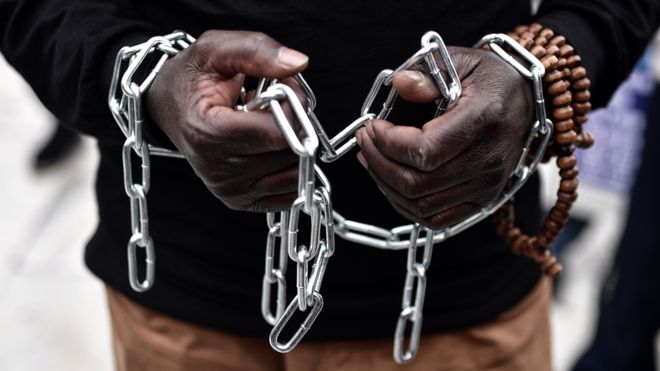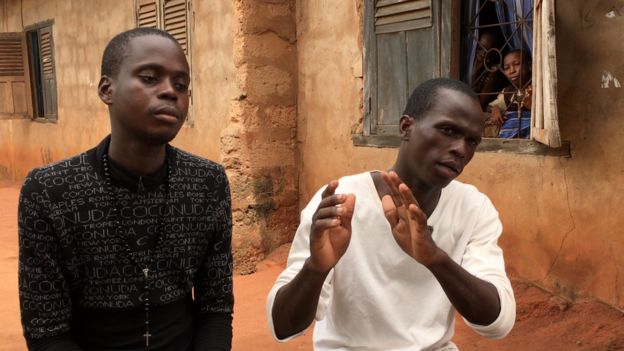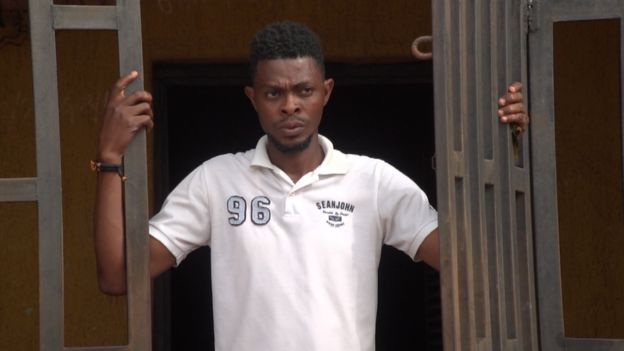Why Were Eritreans, Ethiopians, Somalians And Sudanese Never Used As Slaves? - Foreign Affairs - Nairaland
Nairaland Forum / Nairaland / General / Politics / Foreign Affairs / Why Were Eritreans, Ethiopians, Somalians And Sudanese Never Used As Slaves? (917 Views)
Sudanese Ram Sentenced To 3 Years In Jail After Headbutting Woman To Death / Taliban Fighters Set Woman On Fire For Bad Cooking, Use Girls As Sex Slaves / Former Sudanese Defense Minister Found In Underground Prison (photos) (2) (3) (4)
(1) (Reply)
| Why Were Eritreans, Ethiopians, Somalians And Sudanese Never Used As Slaves? by Litmus: 9:20pm On Jan 02, 2018 |
Nigerians tell of being used as slaves  The European Union is working with Libyan coastguards to reduce the number of migrants crossing the Mediterranean Sea. But many of those intercepted end up in detention centres in Libya, where some migrants say they are used as slaves, as the BBC's Stephanie Hegarty found when she spoke to some Nigerians who have just returned home. As evening falls on Benin City, outside the mildewed 1960s block of one of the city's many hotels, a group of men and women are sitting on a scattering of plastic chairs, under a sign advertising "exotic cocktails" and "groovy nights". But they are not here for drinks or dancing, they are about to start the hard work of rebuilding their lives. They have come from Libya, where most of them were held in detention centres by the Libyan authorities. And they have returned with accounts of horrifying abuse, including being leased or sold as slaves. 'They gave us to their friends' Agen Akhere has a round, baby-face but his small eyes are searing red. He is sniffling as he talks, and looks like he might well up with tears. He was held for two months in a detention centre in a place called Gharyan. He was registered by the UN's migration agency (IOM), released from the detention centre and flown home - but his friend did not make it. "It's because of money," he said, pleading and craning his neck to get closer to the microphone. "My friend, he's still there. His name is Samson. He's still there, in Gharyan." Gharyan is a prison in the mountains about 100km (60 miles) south of Tripoli. And it is a place where all of the migrants we spoke to were taken before they made it home. Again and again they tell the same story, of detainees horrifically abused by prison guards, starved, beaten, raped - and traded as slaves. http://www.bbc.co.uk/news/world-africa-42492687 |
| Re: Why Were Eritreans, Ethiopians, Somalians And Sudanese Never Used As Slaves? by SKhanmi: 11:03pm On Jan 02, 2018 |
OP please change the title, it's quite misleading 3 Likes 1 Share |
| Re: Why Were Eritreans, Ethiopians, Somalians And Sudanese Never Used As Slaves? by Litmus: 11:34pm On Jan 02, 2018 |
Starved. Beaten. Enslaved. http://www.bbc.co.uk/news/av/world-africa-42546065/starved-beaten-enslaved https://www.youtube.com/watch?v=qT94rmeHPsI  "They come to our caravans [cells], they pick six persons to do their dirty jobs to do farming, brick-laying work," says Lucky Akhanene. He returned in the same group as Mr Akhere and was held in Gharyan for four months. "They give us out to their friends. They don't pay us. It's just hard labour, if you're not fast with your job you get beaten." Three separate people spoke about being leased out by the prison for day labour like this. Others said they were sold. Jackson Uwumarogie and Felix Efe were arrested "on top of the sea", off the coast of Libya and taken to Gharyan. They said one night a prison guard came and counted out 20 men, he took them outside and blindfolded them. Mr Uwumarogie overheard the men talking about a price - 1,000 dinars ($735; £550). They were put into a van and taken to a farm. Mr Uwumarogie and Mr Efe were forced to work harvesting onions and feeding cattle. They slept in a plywood hut and were guarded day and night by men with guns. They were never paid. Mr Uwumarogie's baggy tracksuit bottoms hang from his tiny waist and a tight woollen polo neck highlights his skinny frame and slightly puffy, swollen cheeks. He is clearly not well. On the farm they were only given food every few days, he said, and sometimes given sea water to drink. After six months they and five others were loaded into a pick-up truck and taken to the desert. "They dumped us there," Mr Uwumarogie said. They were there for two days. "It was with the help of God that we found the man that rescued us." The man brought them to his house and then took them to Tripoli to meet the IOM.  Stories of black slavery in Libya have been circulating for the past two years. But the number of accounts we heard from recent returnees seems to suggest it has become endemic in the detention system. And it is tied to something that has been going on for much longer: a dark but thriving industry in which migrants are extorted for money by traffickers and prison guards. Wrists tied with barbed wire "There was a connection man who normally has a connection to the Mudeen, that is director of the prison. He would call them and he would bail them out," Mac Agheyere said. He left for Europe in 2015 and was arrested and taken to prison in the Libyan town of Zawiya. "I had no-one to bail me out." He explained that the middleman would charge up to 250,000 naira ($695; £520) per person. |
(1) (Reply)
Just After Trump's Withdrawal Iran Launch Missiles At Israel / Too Dark-skinned to be beauty queen in India / Mozambique - Islamists Behead 50 People In Troubled Province
(Go Up)
| Sections: politics (1) business autos (1) jobs (1) career education (1) romance computers phones travel sports fashion health religion celebs tv-movies music-radio literature webmasters programming techmarket Links: (1) (2) (3) (4) (5) (6) (7) (8) (9) (10) Nairaland - Copyright © 2005 - 2024 Oluwaseun Osewa. All rights reserved. See How To Advertise. 20 |